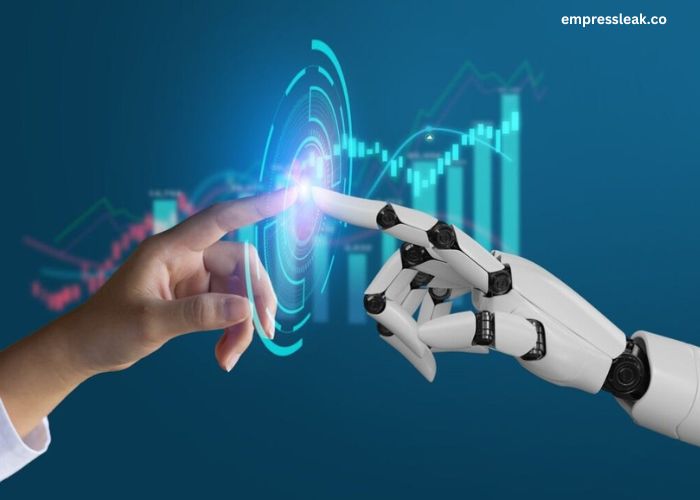Artificial Intelligence (AI) is rapidly transforming every aspect of human life, from healthcare and finance to education and entertainment. As technology advances at an unprecedented pace, AI is becoming more than just a tool; it is a driving force behind the future of innovation. The AI revolution is not just about automation; it is about redefining how humans interact with technology, making processes smarter, faster, and more efficient.
This article explores how AI is shaping the future, its impact on various industries, and the challenges and opportunities that come with it.
The Evolution of AI
AI has come a long way since its inception in the 1950s. Initially, AI was limited to basic problem-solving and rule-based algorithms. However, with the emergence of machine learning, deep learning, and neural networks, AI has reached new heights, enabling machines to perform complex tasks such as speech recognition, natural language processing, and predictive analytics.
Breakthroughs in computing power, the availability of big data, and advancements in algorithms have propelled AI into the mainstream. Today, AI systems can learn from data, adapt to new information, and make decisions with minimal human intervention.
AI in Everyday Life
AI is no longer a futuristic concept; it is already integrated into our daily lives. Some common applications include:
- Virtual Assistants – AI-powered assistants like Siri, Alexa, and Google Assistant help users with tasks like setting reminders, answering questions, and controlling smart home devices.
- Chatbots – Businesses use AI-driven chatbots to provide customer support and automate interactions, enhancing user experience.
- Personalized Recommendations – Streaming services like Netflix and Spotify use AI to suggest content based on user preferences.
- Smart Devices – AI is embedded in smart home devices, security systems, and even wearable technology to improve efficiency and convenience.
AI in Business and Industry
Businesses across various industries are leveraging AI to streamline operations, enhance productivity, and improve customer experiences. Some key areas where AI is making an impact include:
1. Healthcare
AI is revolutionizing healthcare by enabling faster and more accurate diagnoses, personalized treatment plans, and predictive analytics. AI-powered tools can analyze medical images, detect diseases like cancer at an early stage, and even assist in robotic surgeries.
2. Finance
The financial sector relies heavily on AI for fraud detection, risk assessment, and algorithmic trading. AI-powered chatbots and virtual financial advisors are also transforming customer service in banking.
3. Retail and E-commerce
Retailers use AI for inventory management, demand forecasting, and personalized marketing. AI-driven recommendation engines enhance user engagement and boost sales.
4. Manufacturing
AI-powered robots and automation systems optimize manufacturing processes, improve quality control, and reduce production costs. Predictive maintenance powered by AI prevents equipment failures, reducing downtime.
5. Transportation and Logistics
Autonomous vehicles, route optimization algorithms, and AI-powered supply chain management are improving efficiency in transportation and logistics.
6. Education
AI is enhancing education through personalized learning platforms, automated grading systems, and virtual tutors that cater to individual learning needs.
The Role of AI in Emerging Technologies
AI is at the core of several emerging technologies that are shaping the future. Some of these include:
1. Internet of Things (IoT)
AI and IoT work together to enable smart devices that collect, analyze, and act on data in real-time. Smart cities, connected homes, and industrial IoT applications are all powered by AI.
2. Blockchain and AI
Combining AI with blockchain enhances security, transparency, and automation. AI-driven analytics can improve fraud detection and optimize decentralized finance (DeFi) applications.
3. 5G and AI
The rollout of 5G networks is accelerating AI applications by enabling faster data transmission and real-time processing. This is particularly beneficial for autonomous vehicles, smart cities, and remote healthcare.
4. Augmented Reality (AR) and Virtual Reality (VR)
AI enhances AR and VR experiences by improving real-time object recognition, tracking, and interactive elements in gaming, training, and education.
Ethical and Social Implications of AI
As AI continues to advance, ethical concerns and societal implications must be addressed. Some of the key challenges include:
1. Job Displacement
Automation powered by AI is replacing jobs in various sectors, raising concerns about employment. However, AI also creates new opportunities and roles that require human expertise.
2. Bias and Fairness
AI algorithms can inherit biases from training data, leading to unfair outcomes in areas such as hiring, lending, and law enforcement. Ensuring fairness and transparency in AI decision-making is crucial.
3. Data Privacy and Security
AI systems require vast amounts of data, raising concerns about user privacy and data security. Regulations like GDPR and AI governance frameworks are essential to protect user information.
4. Ethical AI Development
Developing AI responsibly involves ensuring transparency, accountability, and ethical considerations. Organizations must prioritize AI ethics to prevent misuse and unintended consequences.
The Future of AI
The future of AI is filled with endless possibilities. Some potential developments include:
- General AI (AGI) – Unlike narrow AI, which is designed for specific tasks, AGI aims to mimic human intelligence across various domains.
- AI and Space Exploration – AI is aiding space exploration, from analyzing astronomical data to assisting in autonomous space missions.
- AI and Creativity – AI is being used in art, music, and content creation, demonstrating its potential for creativity.
- AI and Sustainability – AI-driven solutions can optimize energy consumption, combat climate change, and enhance environmental sustainability.
Conclusion
The AI revolution is shaping the future in unprecedented ways. From transforming industries to enhancing daily life, AI is driving innovation and redefining how humans interact with technology. However, with great power comes great responsibility. Addressing ethical concerns, ensuring fairness, and developing AI responsibly will be critical in shaping a future where AI benefits all of humanity.
As AI continues to evolve, embracing its potential while mitigating its risks will determine how technology shapes the future of society. The AI revolution is here, and the world must adapt to its transformative impact.

